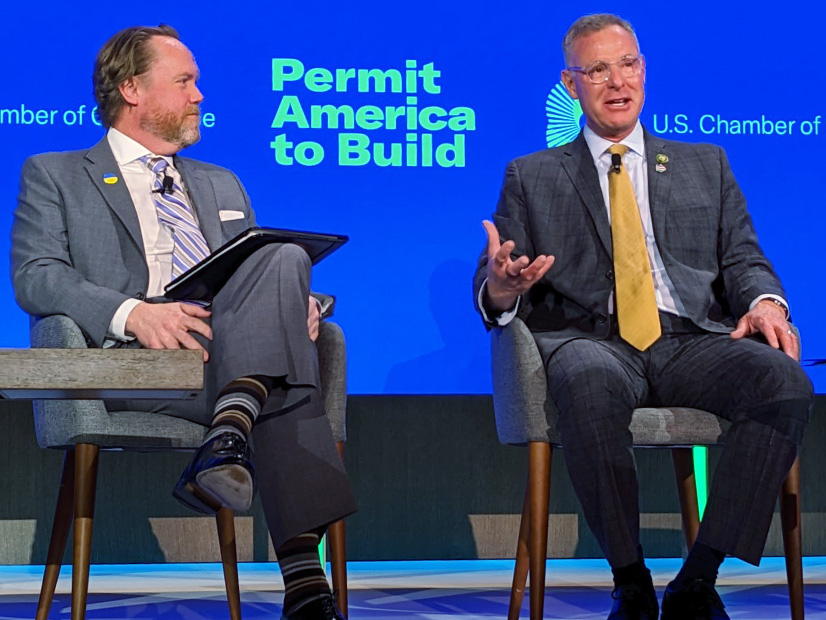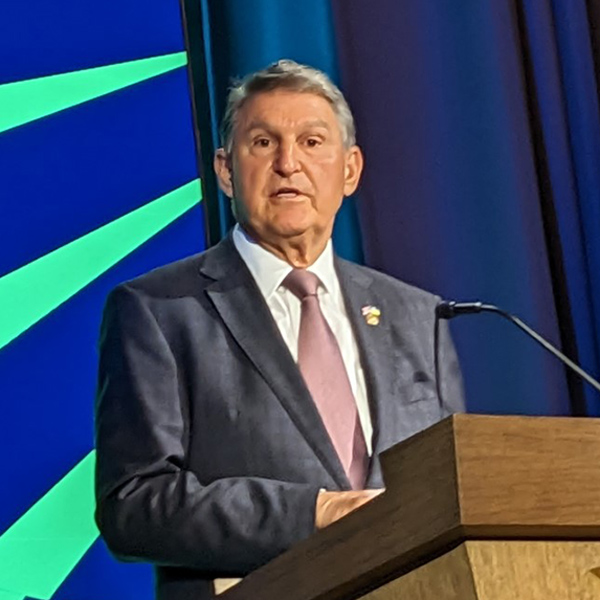WASHINGTON — Democrats in Congress want legislation to streamline and speed up permitting for clean energy projects and transmission, while Republicans want it for mining and drilling on federal lands, and for pipelines for hydrogen and carbon capture projects as well as for oil and natural gas, according to Sen. Shelley Moore Capito (R-W.Va.), ranking member of the Senate Environment and Public Works (EPW) Committee.
And both sides know new laws will be vital for developing domestic supply chains for critical minerals, such as lithium, cobalt and nickel.
Somewhere between these “essential views,” Capito said Tuesday at a breakfast meeting at the U.S. Chamber of Commerce, is the possibility to “forge a compromise … to say to the Democrats on our committee and Republicans on our committee, we may be approaching this from a different angle on where our real needs are.
“Successful legislation is about not just getting but giving up the things that you really don’t want, and so to get there we’re going to have to have that mindset across the committee,” she said.
“Permitting reform,” as it is commonly referred to, has become a high priority for both parties in the 118th Congress and for the Chamber, which has launched its own lobbying campaign called “Permit America to Build.” Tuesday’s event was a kick-off for the campaign, timed to coincide with a fly-in lobbying effort by members of the American Clean Power Association.
The goal for a range of stakeholders is bipartisan legislation that will provide “meaningful” change and break through the congressional inertia that has long surrounded the issue, said Neil Bradley, chief policy officer at the Chamber.
“Unfortunately, this is one of those issues where failure doesn’t immediately lead to catastrophic consequences,” Bradley said. “When we push permitting reform, it’s easy to keep talking about it; it’s easy to keep insisting on one position — your side’s position — while the other side insists on theirs. … Maybe we’ll find a solution later; maybe we’ll get a better outcome after the next election.”
 Christopher Guith (left), U.S. Chamber of Commerce, talks permitting with Rep. Scott Peters (D-Calif.) | © RTO Insider LLC
Christopher Guith (left), U.S. Chamber of Commerce, talks permitting with Rep. Scott Peters (D-Calif.) | © RTO Insider LLC
Leonardo Moreno, president of AES Clean Energy, said the lack of consistency in permitting processes is a key challenge for his company’s efforts to build new solar, wind and storage projects. “If you go to agencies in each of our regions in the U.S., the main agencies are the [Bureau of Land Management], the Army Corps of Engineers and Fish and Wildlife,” Moreno said. “They don’t apply [the National Environmental Protection Act] in the same way; each of them has their own way of applying the process.”
Staff turnover can also mean further delays, leading to requests for new studies on different issues, he said.
But if the passage of the Infrastructure Investment and Jobs Act and the Inflation Reduction Act has not exactly created a sense of urgency, they have at least prompted some serious momentum around the long-dormant issue. The two laws are pouring billions of federal funds into a range of clean energy and other infrastructure projects, and the byzantine federal permitting process is now seen not only as a roadblock for clean energy and other infrastructure but as a national security issue that is integral to building out domestic supply chains.
Exhibit A is the 732-mile TransWest Express transmission line, which filed its first application for a right-of-way on federal land back in 2007 and only recently received final approval from the Bureau of Land Management to start construction. Completion is targeted for 2027, when the high-voltage line will send power from Wyoming wind farms to Southern California. (See TransWest Express to Break Ground After BLM Approval.)
Both EPW and the Senate Natural Resources (ENR) Committee have scheduled hearings on permitting reform, with Sen. Joe Manchin (D-W. Va.) announcing that a Thursday hearing on the Department of Energy’s 2024 budget will take up the issue. Energy Secretary Jennifer Granholm is scheduled to appear.
EPW will hold a hearing specifically on permitting on April 26, as will ENR on May 11.
“These upcoming hearings are vital to understanding how we can achieve bipartisan consensus that makes it possible for America to build again and maintain our status as a global energy leader,” Manchin said in an email statement. “Americans cannot wait any longer, and neither can I.”
NEPA Not Sacrosanct
The question remains: Can a divided Congress pass substantive legislation on permitting, especially when the ruling parties in both houses have narrow majorities?
While Senate Majority Leader Chuck Schumer (D-N.Y.) pronounced the House Republicans’ energy bill H.R. 1 “dead on arrival,” both Capito and Manchin said its permitting provisions, which are almost exclusively focused on fossil fuels, could provide a starting point.
“Nothing should be dead on arrival,” Manchin said at the Chamber event, arguing that looking at the opposition’s proposed legislation allows for a process of improvement. “We’re not going to have a perfect piece of legislation, [but] we can have a piece of much better legislation,” he said.
 Sen. Joe Manchin (D-W. Va.) | © RTO Insider LLC
Sen. Joe Manchin (D-W. Va.) | © RTO Insider LLCBoth Manchin and Capito introduced permitting bills after passage of the IRA. Capito’s Simplify Timelines and Assure Regulatory Transparency (START) Act (S. 4815), stalled out in the EPW Committee, while Manchin made repeated efforts to get his Building American Security Act into other must-pass legislation, such as the National Defense Authorization Act. (See Manchin Permitting Bill Falls Short in Senate.)
Capito laid out what she sees as the core components of any compromise legislation.
First, she said, the bill should be “technology- and fuel-neutral to benefit energy projects of all kinds,” as well as other infrastructure projects, including roads, water and broadband. Another key component would be “enforceable deadlines.” When federal agencies don’t meet deadlines, “what happens?” Capito said. “Basically nothing. … All it does is push more and more of the burden onto whoever the developer is, the builder is, the community is.”
A 60-day deadline for filing judicial challenges to an approved project is another must-have, Capito said. “We’re going to first ask for some substantive changes to the NEPA review, also to the Clean Water Act. … That may be too far of a stretch, but we’re going to try.”
But Rep. Scott Peters (D-Calif.), a former environmental lawyer, says NEPA is not sacrosanct. “That approach simply is not compatible with science [and] the time we have left to maintain a stable climate,” he said.
Peters has made permitting legislation his personal mission and is working across the aisle with Rep. Bruce Westerman (R-Ark.) to find bipartisan solutions. For example, Peters said, “we can reduce the level of review for climate projects on nonsensitive land. … There’s no reason a solar project on degraded land, miles away from people, should go through the same process as a community [solar] project in a local community.”
Judicial review processes should be tweaked “to protect vulnerable communities while preventing wealthy NIMBYs and bad actors from blocking central clean energy projects … and ensure the federal government has the authority to build a reliable, environmental grid,” Peters said.
“If 52 years after NEPA, we’re still complaining about the effect of pollution on underserved communities … it’s time to expand our conversation,” he said. “When there’s so much money out there to do clean energy, and whether you’re a climate activist or just a taxpayer, you don’t want to see that money wasted on process.”
Good Things Fast
The Chamber’s goal is to get a “durable, meaningful” permitting bill passed by the end of the summer, and it aims to keep up the pressure with its lobbying campaign, according to an organization spokesperson.
“In the coming weeks and months, we will hold additional events activating our vast state and local Chamber network,” the spokesperson said. “There will be many conversations both inside and outside the Beltway, and … we will work closely with members of the House and Senate on legislative language consistent with our principles.”
Similar to Capito’s core components, the Chamber is calling for permitting that provides predictability and transparency for businesses, better coordination between federal agencies and broad stakeholder input.
But Jason Grumet, CEO of the American Clean Power Association, believes a more basic shift in mindset is going to be needed. Focusing on national security, economic development and government efficiency have, to date, not gotten the job done on permitting because “there was a perception that this was trying to advance an energy system that was not consistent with environmental imperatives,” he said.
The inefficiency of permitting has been “weaponized” and used to slow down or prevent “high-target infrastructure,” Grumet said.
“There is absolutely no political coalition that can move forward legislation that is simply focused on fossil [fuels],” he said. “There is equally absolutely no possibility of moving legislation through a closely divided Congress that is only focused on clean energy. …
“There’s not a single piece of legislation that can pass this Congress that will be the end of the discussion,” Grumet said. “But it is the beginning of shifting our national consciousness to recognize that making good things happen fast is the future of the country.”
Capito would also like to see a bipartisan permitting bill passed before Congress adjourns for its August recess. While some House Republicans have suggested attaching H.R. 1 to any deal on raising the national debt limit, Capito said the priority should be getting the bill right.
“Get the policy right,” she said. “And then we’ll find the vehicle.”




